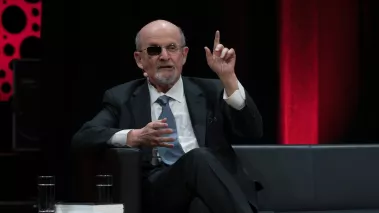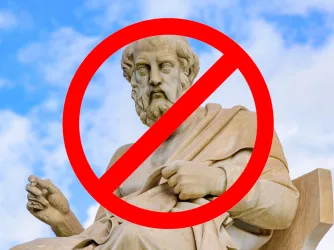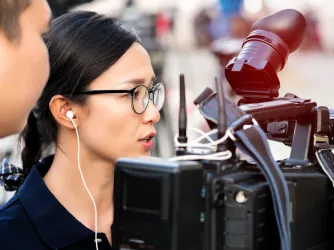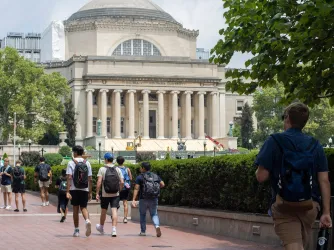Table of Contents
Salman Rushdie calls out left-wing censorship in CBS interview

Markus Wissmann / Shutterstock.com
WATCH: Salman Rushdie on censorship in America today (60 Minutes / CBS News)
In his first television interview since being attacked in 2022 while delivering a speech at the Chautauqua Institution in New York, renowned novelist Salman Rushdie doubled down on his defense of freedom of expression, despite losing his right eye — and almost his life — in an assassination attempt.
Speaking with journalist Anderson Cooper for an episode of “60 Minutes” on CBS that aired Sunday, April 14, Rushdie said that he never really felt unsafe doing public events over the past few decades as he believed that the attempts on his life had passed.
“The irony is that you were there to talk about writers in danger,” Cooper said.
“Yes, exactly, and the need for writers from other countries to have safe spaces in America amongst other places, and then, yeah, it just turned out not to be a safe space for me.”
The assassination attempt stemmed from the decades-old controversy over Rushdie’s novel, “The Satanic Verses,” which Iran’s Ayatollah Khomeini characterized as an attack on Islam and called for Rushdie’s death in response.
One of the arguments that I always try to make is that if you look at the history of censorship, in places where there has been censorship, the first groups that suffer from that are minority groups.
Since then, Rushdie has been an outspoken advocate for freedom of expression. Rushdie even spoke at FIRE’s 20th anniversary gala in 2019.
“This is a bad moment for free expression because the attack is coming from so many different directions,” Rushdie said in the “60 Minutes” interview. “It used to be the case that very conservative voices were the places from which you would hear that such-and-such book should be banned, or is obscene, or is disgusting, or whatever. And there’s a whole project to deny children the ability to learn about the history of their own country.”
But what feels different now, according to Rushdie, is calls for censorship coming from the political left, or what he calls the “offense industry” in the modern media landscape.
“There are progressive voices saying that certain kinds of speech should be not permitted because it offends against this-or-that vulnerable group,” he said, adding that “there seems to be a kind of growing orthodoxy, particularly amongst young people, that censorship in those circumstances is a good thing.”

‘So to Speak’ podcast: Assassin’s veto comes for Rushdie
Journalist Michael Moynihan discusses the attack on Salman Rushdie, what it means for free speech, and the history of “The Satanic Verses” controversy.
Rushdie warns young progressives to be careful what they wish for.
“One of the arguments that I always try to make is that if you look at the history of censorship, in places where there has been censorship, the first groups that suffer from that are minority groups,” Rushdie continued. “So to support censorship in theory, on behalf of vulnerable groups, is a very slippery slope. It can lead to the opposite of what you want.”
“Is there value in hearing from voices that offend us?” Cooper asked.
“Enormous value,” Rushdie responded. “I mean, how would we ever challenge ourselves if we’re not challenged?”
His new book, “Knife: Meditations After an Attempted Murder,” will be released tomorrow.
Recent Articles
Get the latest free speech news and analysis from FIRE.

Can the Pentagon strip Mark Kelly’s rank over speech?

Texas A&M to philosophy professor: Nix Plato or be reassigned

Morgan State says cut the cameras, stop the presses


